The US housing crisis has been building up for years and the main issue is insufficient affordable housing to meet the demand in the US market. Incomes have mostly stayed the same while living costs have increased a lot in recent years. So, it’s hard for low- and middle-income families to find affordable homes. Homeowners in America are not the only ones facing challenges with an unaffordable housing market; renters are also experiencing significant strain. The Joint Center for Housing Studies at Harvard University published a report showing how rising housing costs have burdened homeowners and also renters. Let’s discuss how the real estate technology solutions can help alleviate the US housing crisis.
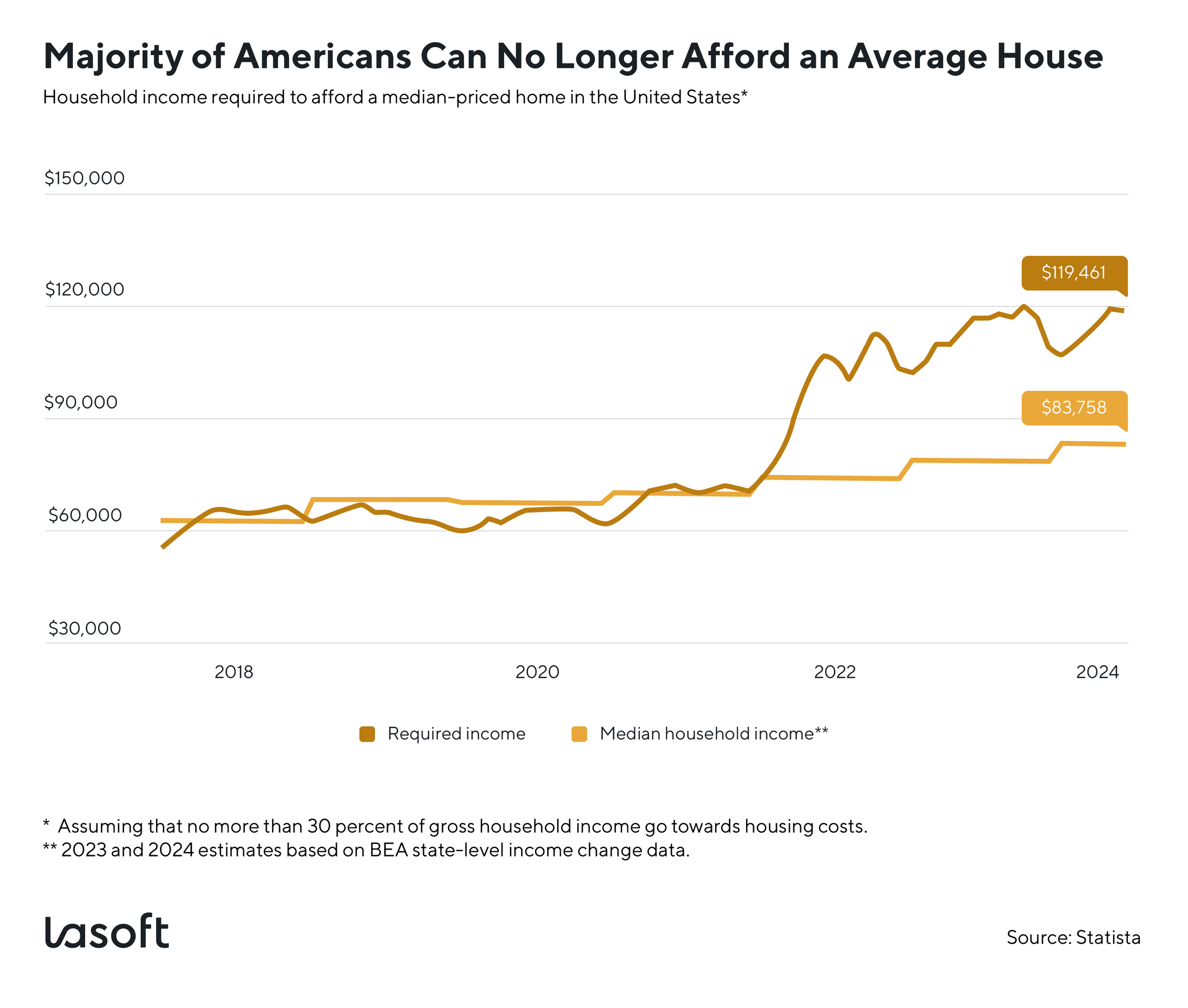
Source: Statista
Housing Shortage Key Factors
1. One of the main problems is rising construction costs. Labor shortages as a global issue, and increased building materials costs have risen considerably in recent years, making building new homes more expensive. As a result, these higher costs are often passed on to buyers or renters.
2. Land costs have increased significantly, making it more expensive to develop new housing. This drives up overall construction costs and limits the affordability of new homes.
3. High mortgage rates are another factor contributing to the housing shortage. When interest rates rise, borrowing becomes more expensive. This makes it more difficult for many potential buyers to purchase a home. First-time buyers are particularly affected because they are unable to meet the higher financial requirements for a mortgage.
4. Strict zoning regulations and lengthy approval processes are slowing down the construction of new homes in many areas. These regulations can delay construction, drive up development costs, and limit the supply of housing in some areas.
5. Increased investment in residential properties by real estate speculators drives up prices and reduces the number of homes available for first-time buyers. Speculative buying practices can contribute to price volatility and further limit housing availability for average customers.
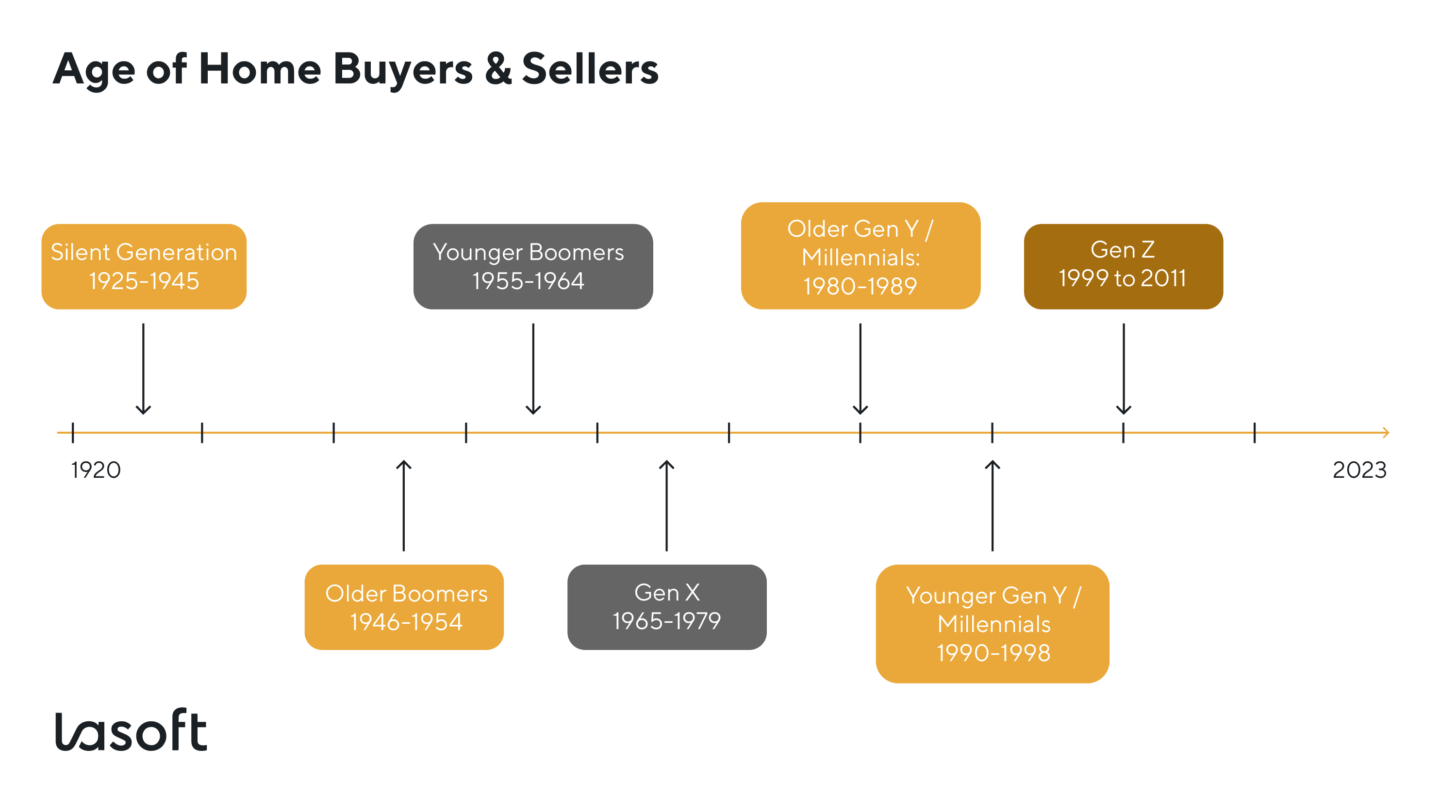
Economic Disparities Impact on Millennial Homebuyers in the US
Millennial homebuyers face challenges due to economic issues caused by COVID-19, the uncertain geopolitical situation due to the wars in Ukraine and Israel, and global political crises. These factors make it difficult for this generation to become homeowners. Compared to previous generations, millennials born between 1981 and 1996 face constant uncertainties and real estate shortages in the market.
Stagnating incomes vs. rising real estate prices
While real estate prices have skyrocketed in recent decades, millennials’ salaries have stagnated. Home prices have risen much faster, making saving for a down payment a challenge. This discrepancy between income growth and the rising cost of living has created an affordability gap.
Student Loan Debt
Many millennials delay purchasing homes because their loan repayments financially constrain them and they are burdened by student loan debt. It cuts them from saving for a mortgage. High debt-to-income ratios also reduce the likelihood of qualifying for a home loan.
Cost of Living
Many millennials prefer to live in urban areas with greater access to jobs, but housing in these areas is often more expensive. Economic disparities mean that only millennials from wealthier backgrounds can afford homes in desirable locations.
Financial Instability and Uncertainty
Economic uncertainty, such as the 2008 recession, the COVID-19 pandemic, the wars in Ukraine and Israel, migration waves, and global geopolitical instability, has disproportionately affected millennials during key earning years. These economic shocks have disrupted financial stability, making it harder for millennials to build wealth and invest in homeownership. Many millennials also struggle with gig economy jobs, which provide less economic security and make it harder to secure a mortgage.
Large Metros Where Millennials Are Buying Homes
| Top Metros | Millennial Share | Bottom Metros | |
|---|---|---|---|
| San Jose-Sunnyvale-Santa Clara, CA | 73.5% | Tucson, AZ | 45.2% |
| San Francisco-Oakland-Berkeley, CA | 69.1% | Las Vegas-Henderson-Paradise, NV | 48.4% |
| Seattle-Tacoma-Bellevue, WA | 68.7% | Jacksonville, FL | 49.0% |
| Austin-Round Rock-Georgetown, TX | 68.7% | Phoenix-Mesa-Chandler, AZ | 49.1% |
| Boston-Cambridge-Newton, MA-NH | 66.9% | Tampa-St. Petersburg-Clearwater, FL | 50.3% |
| Philadelphia-Camden-Wilmington, PA-NJ-DE-MD | 66.0% | Orlando-Kissimmee-Sanford, FL | 51.4% |
| Buffalo-Cheektowaga, NY | 66.0% | Virginia Beach-Norfolk-Newport News, VA-NC | 52.2% |
| Denver-Aurora-Lakewood, CO | 65.9% | Miami-Fort Lauderdale-Pompano Beach, FL | 52.3% |
| Pittsburgh, PA | 65.4% | Riverside-San Bernardino-Ontario, CA | 54.1% |
| New York-Newark-Jersey City, NY-NJ-PA | 65.0% | San Antonio-New Braunfels, TX | 55.7% |
| Hartford-East Hartford-Middletown, CT | 64.7% | Tulsa, OK | 55.8% |
| Minneapolis-St. Paul-Bloomington, MN-WI | 64.6% | Memphis, TN-MS-AR | 57.1% |
| Washington-Arlington-Alexandria, DC-VA-MD-WV | 64.5% | Birmingham-Hoover, AL | 57.4% |
| Chicago-Naperville-Elgin, IL-IN-WI | 64.4% | Oklahoma City, OK | 57.5% |
| Dallas-Fort Worth-Arlington, TX | 64.1% | Louisville/Jefferson County, KY-IN | 57.6% |
Source: Constructioncoverage
The National Association of Realtors report analyzes the behaviors of US home buyers and sellers across different generations. The infographic shows that millennials, both younger (ages 25 to 33) and older (ages 34 to 43), account for a combined 38% of the home-buying market.
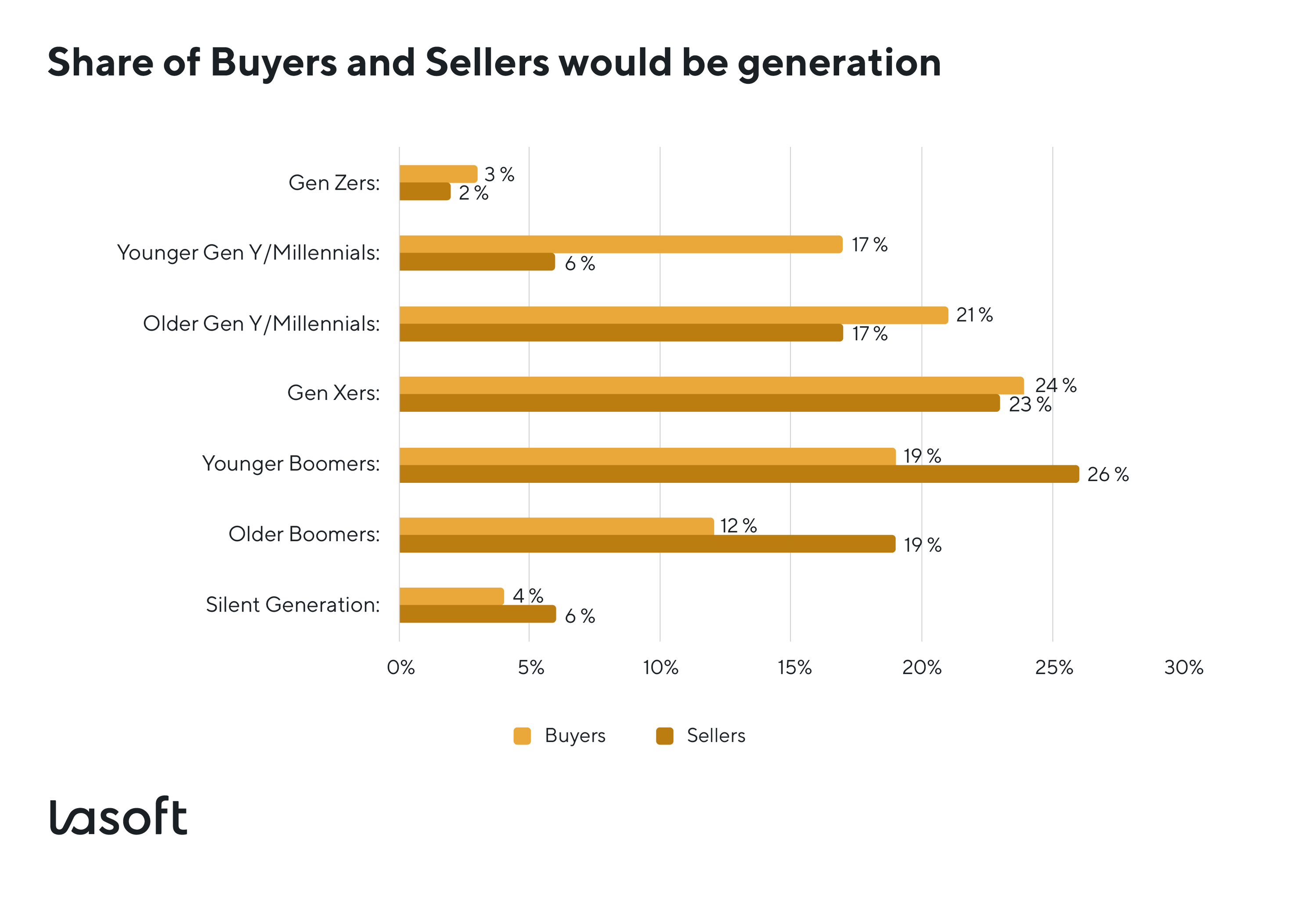
Source: National Association of Realtors
Millennials as Tech-Oriented Generation
Digital advancements have transformed the property market, as real estate technology plays a vital role in how millennials search for homes. Millennials are about twice as likely as older baby boomers to use mobile devices in their home searches. According to the National Association of Realtors (NAR), 76% of homebuyers use mobile devices or tablets when searching for a home, and millennials are the largest group.
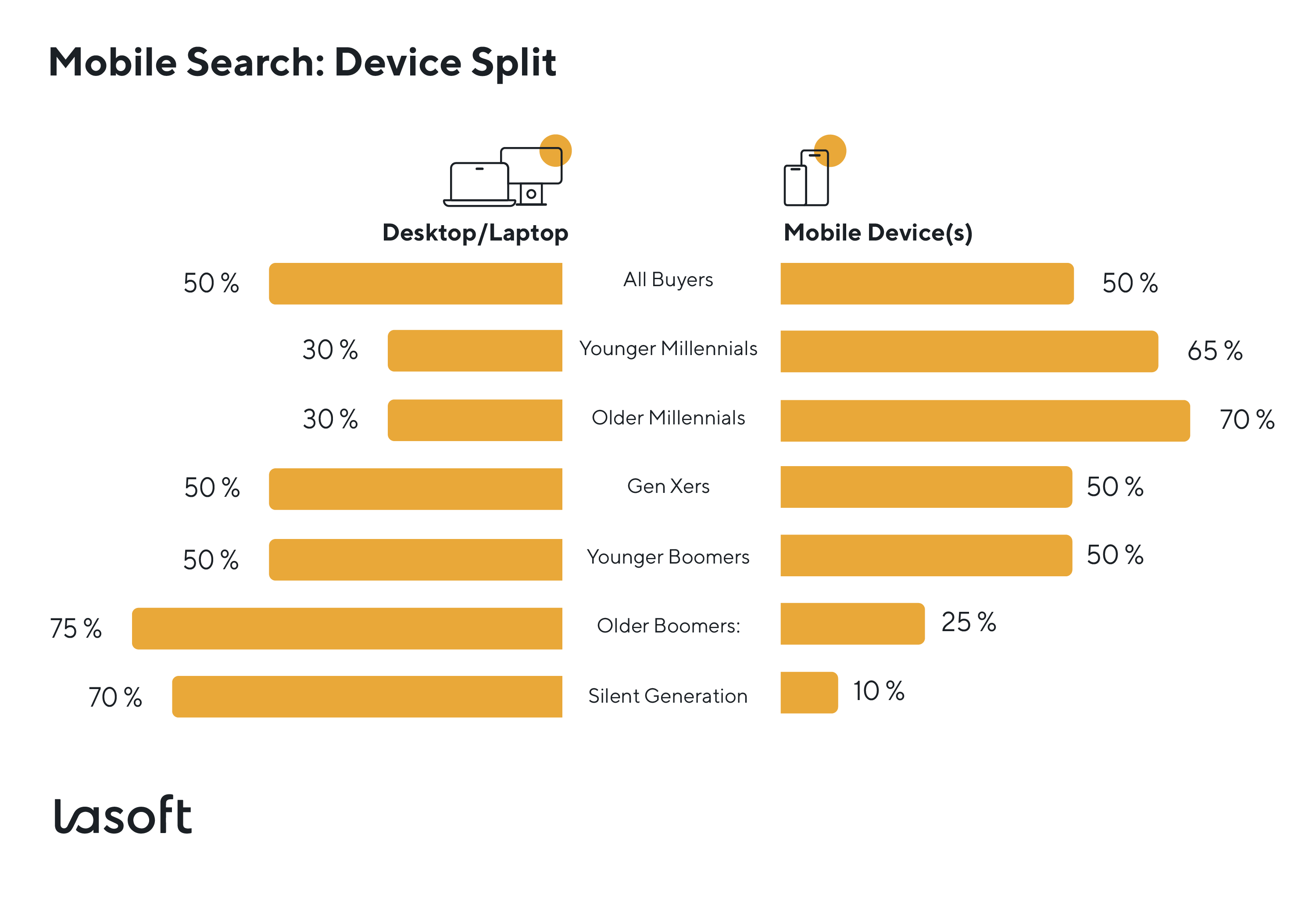
Communication with Realtors
Millennials also differ in how they communicate with realtors, preferring to use text messaging for most interactions. They use text to express interest in a property, schedule viewings, and ask questions, reserving phone calls for more urgent matters. Millennials are also pushing for more innovative property listings, with agents frequently using video tours and livestreams to give a broader view of properties.
Blockchain Technology
As a tech-savvy generation, millennials want efficiency in all aspects of their everyday lives. They appreciate the potential of blockchain technology, which is decentralized and transparent. Blockchain offers benefits like streamlined, secure, and cost-effective ways to acquire real estate.
1. It increases transparency in real estate transactions by providing a public, non-changeable ledger of all activity.
2. Blockchain technology speeds up the process by enabling direct peer-to-peer transactions. Millennials, accustomed to the speed of digital services, often find that traditional real estate transactions need to be faster.
3. By avoiding intermediaries such as brokers, blockchain technology lowers the costs of real estate transactions.
5. And one more vital option: this technology helps with fractional real estate ownership, which is trending in the US. It allows buyers to invest in real estate without purchasing an entire property. Through tokenization, a property can be divided into smaller, tradable shares, making it easier for buyers to enter the real estate market with smaller down payments.
| Feature | Traditional Real Estate | Blockchain-Enabled Real Estate |
| Transaction Transparency | Limited; relies on intermediaries | High; all parties have access to the shared ledger |
| Security | Susceptible to fraud and errors | Enhanced security through encryption and decentralized network |
| Efficiency | Often slow and paper-based | Streamlined processes with faster transaction times |
| Data Integrity | Centralized databases prone to errors | Tamper-proof and immutable records |
AI, ML, and Big Data in PropTech
Artificial intelligence and machine learning are changing how people in real estate industry look at market trends and make decisions based on data. AI can find patterns by studying large amounts of information, like property listings, past sales, economic signs, and even social media trends.
Real estate agents and brokers use AI tools to get precise property values, spot market changes, and find good investment chances. This helps them give better advice to clients, improve pricing strategies, and make decisions based on facts in a fast-changing market.
AI makes finding a place more personal and effective for home buyers and renters. AI-based platforms can look at users’ likes and suggest homes that fit their needs and budgets. This makes the often stressful process of searching for a home easier.
Many businesses use artificial intelligence, machine learning, and big data to elevate decision-making, automate routine operations, and personalize buyers’, sellers’, and investors’ experiences.
Big Data transforms how properties are bought, sold, and managed in real estate industry. Big Data tools provide real-time analytics, considering neighborhood crime rates, school ratings, traffic patterns, and proximity to amenities.
Virtual Reality and Internet of Things
VR helps potential buyers with virtual tours of properties, making the process engaging and convenient as this technology enables buyers to “visit” homes from any place in the world.
The Internet of Things refers to devices and appliances connected to the cloud, continuously sending and receiving valuable data. In real estate business, integrating IoT technology has created a new realm of smart homes.
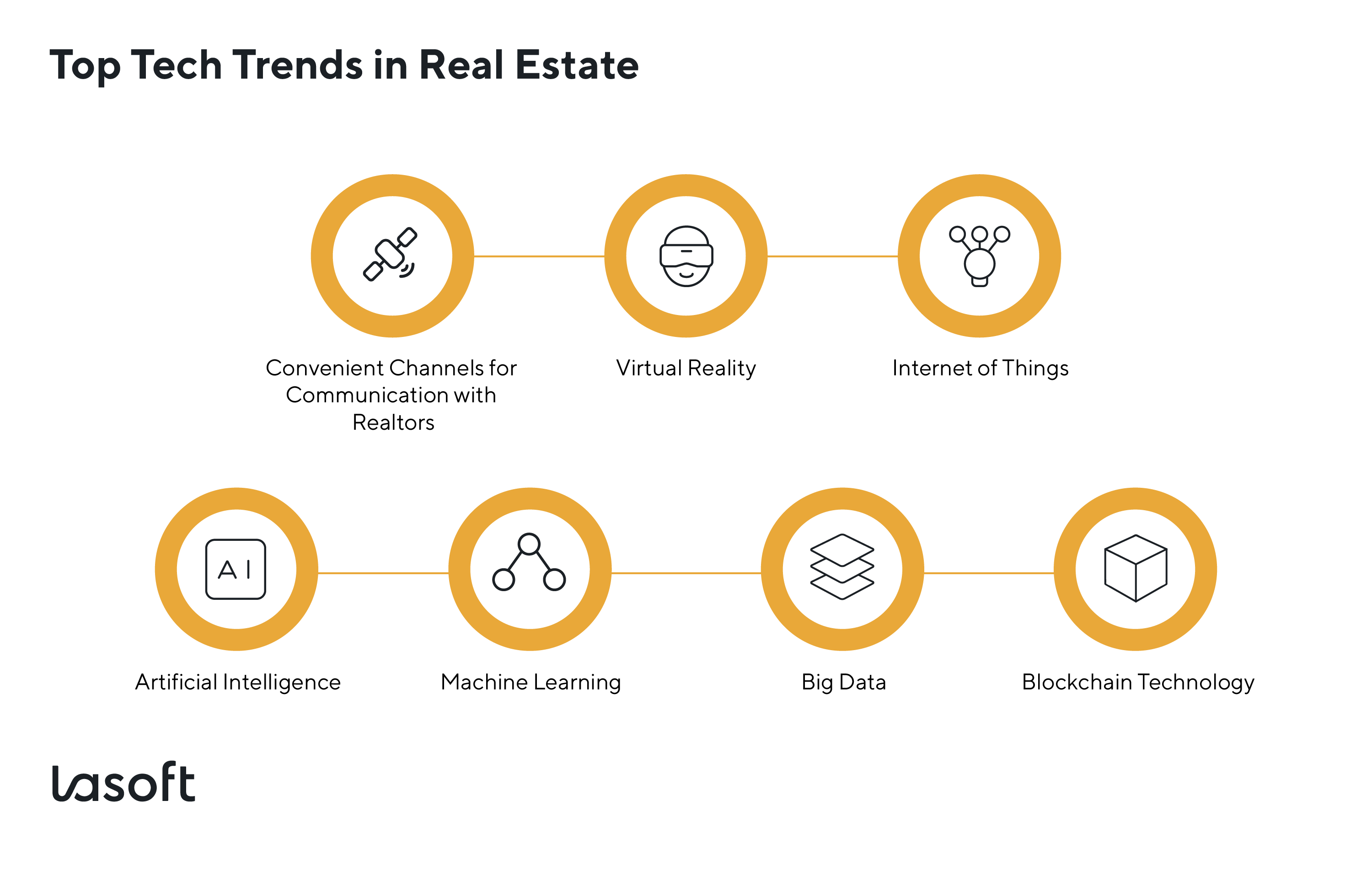
Some Useful Features for a Real Estate Online Platform and Mobile Application
LaSoft advises essential and popular features to offer users of your proptech product, to create a user-friendly real estate online platform or mobile application. These features can help buyers, sellers, agents, and investors find attractive property offers or real estate professionals in the market more effectively.
| Advanced Search | Filters and sorting enable users to search for properties based on specific criteria, such as location, price, property type, size, amenities, and proximity to schools, hospitals, or transportation. An interactive map, as a part of visual search, displays properties, allowing users to explore listings visually and see nearby amenities. |
| Virtual Tours and 3D Photos | Provide 3D virtual tours that allow users to walk through properties virtually. You can also offer a 360º photo option instead of a VR feature to enhance potential buyers’ interaction by showing panoramic views of properties. |
| Favorites and Shortlisting | Users can save and compare favorite properties for future reference and get notifications when saved properties have updates, such as price changes or new photos. |
| Real-time Communication | In-app messaging enables buyers and sellers (or agents) to communicate directly within the platform. |
| Home Valuation Tools | The real estate platform or mobile application should incorporate tools that help users estimate the value of a property based on market data, location, and features. |
| Calculators | Users can calculate estimated monthly payments based on loan terms, interest rates, and down payments. It helps determine how much they can afford by considering their income, debts, and financial goals. |
| User Reviews and Ratings | Allow users to rate real estate agents and read reviews to ensure they choose reliable professionals. And buyers can leave feedback on properties to help others with decision-making. |
| Secure Document Management | Electronic signatures enable the digital signing of contracts, agreements, or receipts, making it easier to finalize transactions. Secure options should allow users to securely upload, store, and share any documents (e.g., property deeds and mortgage agreements). |
| Push Notifications | These features keep users updated on the status of their deals, whether it’s an inquiry response, contract status, or scheduled visits. |
| Integration with Smart Home and IoT Features | Your real estate mobile app can list the integrated IoT device types (e.g., thermostats and security systems). Notify users about potential issues like energy usage or system failures in smart homes. |
| Video Walkthroughs and Livestreaming | Allow agents or sellers to livestream property tours for real-time interactions with potential buyers. Another option your platform can offer is to upload professional video walkthroughs of properties. |
| Property Comparison Option | Let users compare multiple properties by key features such as price, size, location, and amenities. |
| Secure Payment Options | Allow secure in-app transactions for deposits or reservation fees. Offer different financial services that are in demand in the real estate market. You can partner with mortgage lenders, insurance companies, or banks to offer direct financing options. |
| Client Profiles and Customization | Enable users to create profiles that track their preferences, saved searches, and recent activity. Users should have the option to customize their dashboard to focus on what matters most (e.g., new listing, upcoming viewing of an apartment). |
| Real-Time Analytics Options | Provide potential ROI estimates for investment properties. Display real-time data on property appreciation, market demand, and average rental yields. |
| Language and Currency Options | Provide language options for international users. Also, you can offer a built-in currency converter for global buyers and sellers. |
Real Estate Technology Helps Alleviate Housing Crisis
The power dynamics between homebuyers and sellers present a significant challenge for millennials in the housing market. As buyers, millennials often struggle with negotiating favorable terms or addressing property-related issues. Sellers, especially in high-demand markets, hold considerable power due to limited housing supply.
The housing affordability crisis has worsened this imbalance, as sellers can set higher prices and dictate contract terms due to solid demand and limited inventory. This dynamic leaves buyers with less room for negotiating purchase prices, repairs, or closing terms, especially in a competitive market where they may need to outbid other interested parties.
In the digital age of real estate business, an online platform can be a powerful tool to empower homebuyers by providing a transparent, competitive, and efficient marketplace for both buyers and sellers.
1. An online platform or a mobile app simplifies the process for buyers to find suitable properties. Instead of manually browsing countless listings, buyers can submit inquiries outlining their budget, preferred location, and desired features. Sellers then receive tailored buyer requests, streamlining the matching process.
2. Buyers often have specific preferences when searching for a home, including location, size, amenities, and price range. An auction platform lets buyers specify these needs upfront, giving sellers and real estate agents insights into what buyers seek. This tailored approach helps buyers find homes that meet their criteria.
3. A real estate platform fosters transparency by displaying real-time offers and bids. Buyers can see competing bids, allowing them to make informed decisions based on current market conditions and property values.
4. The competitive bidding environment allows buyers to bid on properties, often leading to more favorable terms for sellers. While this dynamic may increase prices, it also gives buyers access to a wide range of properties and allows them to participate in fair, open bidding.
5. A digital platform or real estate website simplifies buying, from property viewing to contract negotiation and signing. Buyers and sellers can conduct all transactions through the platform, with e-signatures available for seamless contract completion, reducing the time and effort required for traditional paperwork.
6, With built-in tools like video chat, buyers can engage directly with sellers or real estate agents in real time, asking questions, negotiating terms, and ensuring transparency. This open communication helps build trust and reduces the risk of fraud, as the platform ensures the security of each transaction.
LaSoft Real Estate Platform NDA Case Study
The LaSoft team has developed the real estate portal to simplify the Dutch market’s real estate and real estate transactions management. Any registered European agency can post offers (apartments, houses, commercial real estate). The platform is available in Dutch and English. Our client, a real estate management company, wanted to build a digital product to simplify the interaction between property managers, tenants, and landlords.
Solution
LaSoft developed a real estate platform that met the client’s requirements through the following key features:
Real estate management dashboard
The platform provides property managers with a centralized dashboard to monitor and manage multiple properties. There’s an option to view property details, tenant information and lease agreements, allowing you to keep track of every deal.
Automated rent collection
The solution integrates secure payment gateways to automate rent payments, helping tenants to pay their rent online. This option also simplifies accounting for property managers and landlords.
Management of rental contracts
The platform enables property managers to create, manage and renew rental agreements electronically. Tenants can review and sign leases digitally, reducing paperwork and making the process more efficient.
Tenant dashboard
The platform provides tenants with a personalized dashboard where they can view their leases, payment history, and upcoming lease due dates. Tenants can also track the status of their maintenance requests and messaging with the property manager.
Real-time notifications
The platform sends real-time notifications for important events, such as upcoming lease due dates, lease renewals, or maintenance updates, ensuring tenants and property managers stay informed.
Outcomes
The development and deployment of this Dutch platform brought several tangible benefits to the client:
1. The automation of rent payments reduced the administrative and financial burden on the property management company.
2. The platform improved communication between tenants and property managers, resulting in faster issue settlement and higher satisfaction for the parties concerned.
3. Property managers now have access to real-time data and analytics that allow them to optimize their properties’ performance.
Final Insights
By embracing real estate technology, homebuyers and sellers can benefit from enhanced transparency, streamlined transactions, and improved communication. For millennials, who value efficiency and tech-driven solutions, such a platform offers a modern way to navigate the real estate market, empowering them to find homes that suit their needs while ensuring fair and transparent interactions with sellers.



